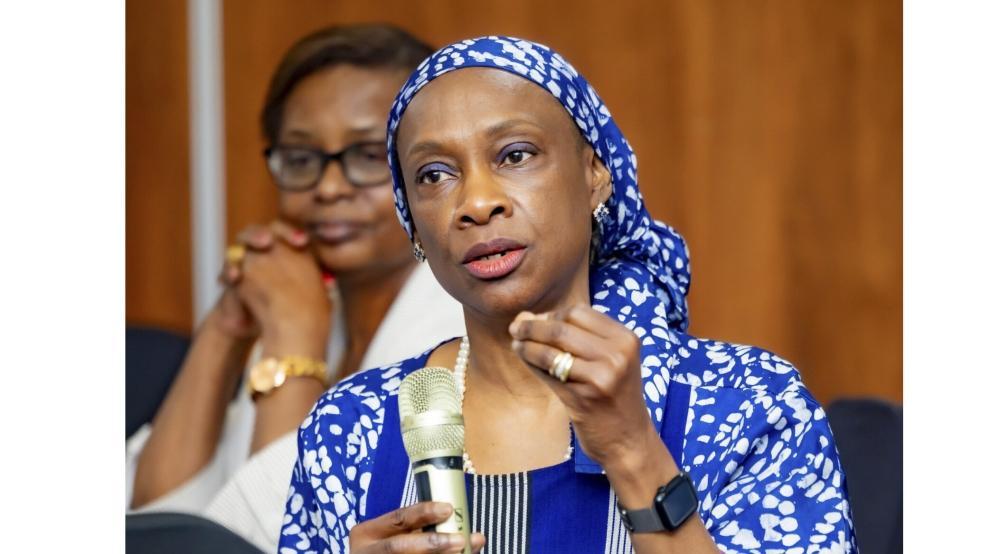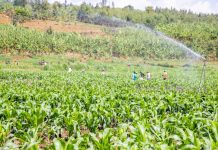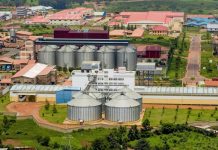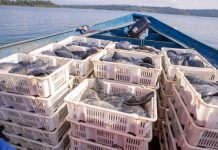Africa-Press – Rwanda. The African Development Bank (AfDB) has announced plans to channel about $300 million (approx. Rwf432 billion) into Rwanda’s agriculture next year to support the sector’s growth.
This comes as the bank’s portfolio continues to drive progress in infrastructure, particularly energy, water, and transport, with a stronger focus now shifting toward agribusiness.
The announcement was made in Kigali on Wednesday, November 12, during the opening of the 2025 Country Portfolio Performance Review (CPPR) workshop, jointly convened by the Government of Rwanda and AfDB. The two-day workshop aims to enhance project delivery and deepen the impact of AfDB’s portfolio in Rwanda.
Portfolio with a transformative footprint
According to Aissa Toure Sarr, AfDB’s Country Manager in Rwanda, the bank currently supports 28 active projects, with infrastructure accounting for 85 per cent of the portfolio.
Aissa Toure Sarr, AfDB’s Country Manager in Rwanda, speaks during the opening of the 2025 Country Portfolio Performance Review (CPPR) workshop, in Kigali on Wednesday, November 12. Courtesy
Over the past 10 to 15 years, she said, AfDB’s footprint in Rwanda has been predominantly in infrastructure development, particularly in water and sanitation, transport, and energy. The bank’s portfolio in Rwanda stands at $2.5 billion, representing a substantial investment in capital-intensive sectors essential for sustainable growth.
Sarr said that AfDB’s investments have impacted Rwanda’s socio-economic landscape. Water and sanitation account for 34 per cent of the portfolio, followed by energy (30 per cent) and transport (16 per cent), with the remaining share covering private sector and human capital development.
“Rwanda is one of the countries that really leapfrogged in terms of access to energy,” she said.
“When I joined the Bank less than five years ago, the access rate was around 60 per cent. We are now close to 85 per cent [thanks to collaboration with the government].”
She added that the impact of these projects extends beyond the sectors themselves.
“Access to energy means schools and businesses can operate effectively; access to roads allows people to reach hospitals and agricultural sites. The impact goes beyond the sector in which we have invested,” she argued.
Agriculture and integrated investments
As Rwanda targets universal access to electricity by 2029 and major energy projects near completion, Sarr said the proposed plan is to direct new AfDB investments mainly toward agriculture and agro-industrial value chains, emphasising an integrated development approach.
“For the next year, there is approximately $300 million in the pipeline for two projects. One in irrigation, as a second or third phase to a big irrigation project that we call Muvumba, that we have in Nyagatare,” she said.
“We have another big investment in agriculture. We’ll gradually [shift] to agriculture, agro-processing.
”Again, don’t forget that it’s an integrated approach. So, that means we are not going to depart from the initial investment,” Sarr said. She stressed bank’s commitment to ensuring greater value for money from each dollar invested.
Contribution to infrastructure and utilities
Emmanuel Nuwamanya, acting Head of Policy and Planning at the Ministry of Infrastructure, commended AfDB’s contribution to Rwanda’s development, particularly in supporting socio-economic transformation and improving citizen well-being.
Nuwamanya highlighted progress made under the seven-year National Strategy for Transformation (NST1), which concluded in June 2024 and the subsequent five-year NST2, underscoring AfDB’s critical role in energy, water, and transport.
In the energy sector, he said AfDB had been instrumental in expanding electricity access. With the bank’s support, we are on track to achieve universal access by 2029, he stated.
“Access to energy has already grown from 34 per cent to over 80 per cent of households, and more than 90 per cent of administrative cells are now connected to the grid,” Nuwamanya said.
The two-day workshop aims to enhance project delivery and deepen the impact of AfDB’s portfolio in Rwanda.
Turning to water and sanitation, he said AfDB’s investments have transformed the sector that once relied almost entirely on domestic funding and lacked massive investments.
Water production capacity has increased from 329,000 cubic meters per day [under NST1] to over 340,000 cubic metres currently, he said.
He pointed out that AfDB-funded projects are expected to help the country double water production capacity to more than 600,000 cubic metres per day.
In the transport sector, he cited major improvements in road infrastructure.
“If you look at the paved road network, Rwanda had about 1,279 kilometres of roads in good condition in 2017. Today, that figure is nearly 1,800 kilometres, with AfDB-financed projects contributing significantly to this progress,” he said.
Rwanda’s strong partnership with AfDB
Rwanda’s effective management of AfDB resources continues to attract the Bank’s confidence, the officials said. While allocations for the 2026–2028 funding cycle will be confirmed later this year, Sarr said the country is expected to receive an average of $300 million, with potential access to an additional of at least $100–150 million from AfDB’s performance-based annual allocation window.
Sustaining results through strong collaboration
Gerald Mugabe, Director General for External Finance at the Ministry of Finance and Economic Planning lauded AfDB’s consistent support and reaffirmed Rwanda’s commitment to maximising the impact of projects funded by the bank.
“The achieved success reinforces our mutual accountability and commitment to achieving the desired outcomes of bank-supported projects,” Mugabe said.
“Together, we are committed to tackling implementation bottlenecks and ensuring that every franc invested translates into measurable progress for Rwandan citizens,” he said.
Delegates poses for a group photo during the opening of the 2025 Country Portfolio Performance Review (CPPR) workshop.
For More News And Analysis About Rwanda Follow Africa-Press









